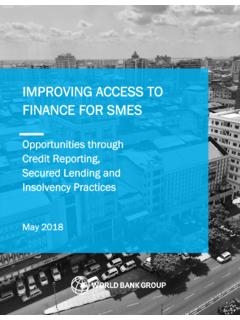Transcription of THE ROLE OF FINANCIAL INTERMEDIATION IN THE …
1 International Journal of Advanced Research in Management and Social Sciences ISSN: 2278-6236. THE ROLE OF FINANCIAL INTERMEDIATION IN THE GROWTH OF small AND. MEDIUM MANUFACTURING ENTERPRISES IN KENYA: A SURVEY OF small . AND MEDIUM ENTERPRISES IN NAIROBI. C. J. Mairura*. Prof. Namusonge**. Dr. Kabare Karanja**. Abstract: The purpose of this study was to establish the role of FINANCIAL INTERMEDIATION in promoting the growth of small and medium manufacturing enterprises in Kenya. It has been observed that FINANCIAL intermediaries play an important role in supporting entrepreneurs who start innovative activities such as new businesses.
2 The study sought to examine the nature of support SMEs receive from FINANCIAL INTERMEDIATION , to identify the evaluation procedures undertaken by FINANCIAL INTERMEDIATION before they offer support, to examine the regulatory framework in place for the support on SMEs, to establish how managerial competence influence support to SME's and its effects on SMEs' growth. Differences in regulations governing banking and non-bank FINANCIAL intermediaries, lack of autonomy and weak supervisory capacities to carry out the Central Bank's surveillance role and enforce banking regulations, inappropriate government policies which contributed to an accumulation of nonperforming loans, and non-compliance by FINANCIAL institutions to regulatory requirements of the 1989 Banking Act among others posed a challenge to the Kenya banking system.
3 Many banks that collapsed in the late 1990's were as a result of the poor management of credit risks which was portrayed in the high levels of nonperforming loans ROK (2005). The primary data was collected through structured questionnaires containing both closed and open ended questions. The data was analysed using descriptive statistics such as frequency, percentages, means and standard deviation as well as inferential statistics such as ANOVA, Multiple linear regression and correlation analysis. The findings show that most of the respondents agreed with the fact that, they received a lot of support from the FINANCIAL intermediaries, Support received enhanced business growth, Vol.
4 2 | No. 5 | May 2013 IJARMSS | 111. International Journal of Advanced Research in Management and Social Sciences ISSN: 2278-6236. Growth of business is attributed to the nature of support received as accounted by percent, who agreed that they received a lot of support, percent said that support received enhanced business growth and percent strongly agree and agree cumulative responses. The findings of the study showed the role played by FINANCIAL intermediaries in promoting SMEs' growth in Kenya. The results of the study form the basis for recommendations to relevant stakeholders to ascertain the appropriate leading strategy for improving SME sector in Kenya.
5 Keywords: growth, manufacturing, FINANCIAL INTERMEDIATION , SME, Kenya. Vol. 2 | No. 5 | May 2013 IJARMSS | 112. International Journal of Advanced Research in Management and Social Sciences ISSN: 2278-6236. INTRODUCTION. Studies by Winborg and Landstrom (2001) demonstrated the positive impact and dynamic role that SMEs play in most developing countries. Globally the small and medium enterprise sectors of individual nations are growing in size and significance. Consequently, the successful provision of business assistance has come to be viewed as imperative in terms of advancing the fortunes of the small business sector and in contributing to economic growth.
6 Mostly, the assistance in this sector is finance, market information, etc. Access to credit has been considered as one of the main problems that SMEs have to deal with in order to survive and keep growing (Peel & Wilson, 1996). An appropriate combination of access to credit, credit conditions, and adequate FINANCIAL and operational policies, is the only way to deal with the complex problem of SMEs survival and growth. It is widely recognized that FINANCIAL institutions play an important role in supporting entrepreneurs who start innovative activities such as new businesses.
7 About 475,000 (four hundred and seventy five thousands) new jobs were created between 2006 and 2007 with the informal sector accounting for 427,000 (four hundred twenty seven thousand) of the additional jobs ( ). ROK. (2008). The growth was attributed to the favourable business environment, availability of credit from FINANCIAL institutions, and increase in investment opportunities in Kenya. However, the sector has potential to employ more, if proper mechanisms are put in place with full support of the implementers. PROBLEM STATEMENT. Access to credit has been considered as one of the main problems that SMEs have to deal with in order to survive and keep growing.
8 An appropriate combination of access to credit, credit conditions, and adequate FINANCIAL and operational policies, is the only way to deal with the complex problem of SMEs survival and growth. This study assessed the role of FINANCIAL INTERMEDIATION in promoting the growth of small and Medium Enterprises (SMEs). with a special focus on manufacturing businesses in Nairobi. small -scale enterprises have become important contributors to the Kenyan economy. The sector contributes to the national objective of creating employment opportunities, training entrepreneurs, generating income and providing a source of livelihood for the majority of low-income households in the country (ROK, 2005) accounting for 18 per cent of GDP.
9 With about 70 per cent of such enterprises located in rural areas, the sector has a high potential Vol. 2 | No. 5 | May 2013 IJARMSS | 113. International Journal of Advanced Research in Management and Social Sciences ISSN: 2278-6236. for contributing to rural development. Yet the majority of entrepreneurs in this sector are considered un-creditworthy by most formal credit institutions. Whereas a small number of NGOs finance an increasing number of micro-enterprise activities, most formal institutions still deny these enterprises access to their services.
10 As the FINANCIAL sector grows, institutional diversity is expected. However, this has not been the case, as reflected in the limited growth of other competing institutions like Post Bank, insurance and the Nairobi securities and exchange. The Kenyan banking sector is dominated by a few large firms, which focus mainly on short-term lending. Lack of access to credit is the major constraint inhibiting the growth of MSEs, and more so for women entrepreneurs. The issue and problems limiting SME acquisition of FINANCIAL services include lack of tangible security coupled with inappropriate legal and regulatory framework, and limited access to formal financing due to poor and insufficient capacity to deliver FINANCIAL services to SMEs (ROK, 2005).










